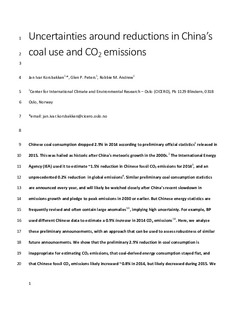Uncertainties around reductions in China's coal use and CO 2 emissions
Peer reviewed, Journal article
Accepted version
Permanent lenke
http://hdl.handle.net/11250/2484050Utgivelsesdato
2016Metadata
Vis full innførselSamlinger
- Journal articles [478]
Sammendrag
Chinese coal consumption dropped 2.9% in 2014 according to preliminary official statistics1 released in 2015. This was hailed as historic after China’s meteoric growth in the 2000s2. The International Energy Agency used it to estimate ~1.5% reduction in Chinese fossil CO2 emissions for 20143, and an unprecedented 0.2% reduction in global emissions4. Similar preliminary coal consumption statistics are announced every year, and will be watched closely after China’s recent slowdown in emissions growth and pledge to peak emissions in 2030 or earlier. However, Chinese energy statistics are frequently revised and often contain large anomalies5, 6, implying high uncertainty. For example, BP used different Chinese data to estimate a 0.9% increase in 2014 CO2 emissions7, 8. Here, we analyse these preliminary announcements, with an approach that can be used to assess the robustness of similar future announcements. We show that the preliminary 2.9% reduction in coal consumption is inappropriate for estimating CO2 emissions, that coal-derived energy consumption stayed flat but is likely to have decreased in 2015, and that Chinese fossil CO2 emissions probably increased ~0.8% in 2014. We also analyse recent revisions of official energy statistics, and find that they imply 925 MtCO2 (11.2%) higher emissions for 2013, and 7.6 GtCO2 (9.2%) higher total emissions for 2000–2013.
